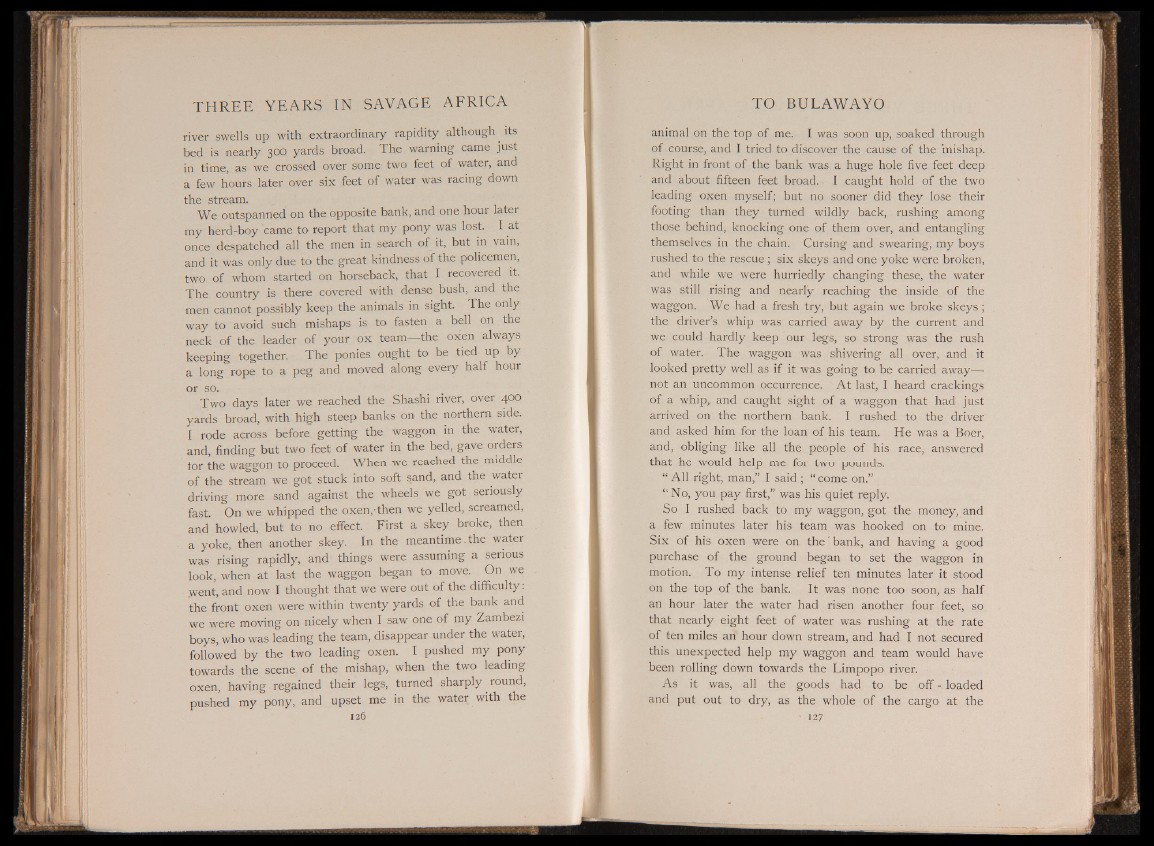
river swells up with extraordinary rapidity although its
bed is nearly 300 yards broad. The warning came just
in time, as we crossed over some two feet of water, and
a few hours later over six feet of water was racing down
the stream.
We outspanned on tire opposite bank, and one hour later
my herd-boy came to report that my pony was lost. I at
once despatched all the men in search of it, but in vain,
and it was only due to the great kindness of the policemen,
two of whom started on horseback, that I recovered it.
The country is there covered with dense bush, and the
men cannot possibly keep the animals in sight. The only
way to avoid such mishaps is to fasten a bell on the
neck of the leader of your ox team—the oxen always
keeping together. The ponies ought to be tied up by
a long rope to a peg and moved along every half hour
or so.
Two days later we reached the Shashi river, over 400
yards broad, with high steep banks on the northern side.
I rode across before getting the waggon in the water,
and, finding but two feet of water in the bed, gave orders
for the waggon to proceed. When we reached the middle
of the stream we got stuck into soft sand, and the water
driving more sand against the wheels we got seriously
fast. On we whipped the oxen, then we yelled, screamed,
and howled, but to no effect. First a skey broke, then
a yoke, then another skey. In the meantime.the water
was rising rapidly, and things were assuming a serious
look, when at last the waggon began to move. On we
.went, and now I thought that we were out of the difficulty:
the front oxen were within twenty yards of the bank and
we were moving on nicely when I saw one of my Zambezi
boys, who was leading the team, disappear under the water,
followed by the two leading oxen. I pushed my pony
towards the scene of the mishap, when the two leading
oxen, having regained their legs, turned sharply round,
pushed my pony, and upset me in the water with the
126
animal on the top of me. I was soon up, soaked through
of course, and I tried to discover the cause of the mishap.
Right in front of the bank was a huge hole five feet deep
and about fifteen feet broad. I caught hold of the two
leading oxen myself; but no sooner did they lose their
footing than they turned wildly back, rushing among
those behind, knocking one of them over, and entangling
themselves in the chain. Cursing and swearing, my boys
rushed to the rescue ; six skeys and one yoke were broken,
and while we were hurriedly changing these, the water
was still rising and nearly reaching the inside of the
waggon. We had a fresh try, but again we broke skeys;
the driver’s whip was carried away by the current and
we could hardly keep our legs, so strong was the rush
of water. The waggon was shivering all over, and it
looked pretty well as if it was going to be carried away—
not an uncommon occurrence. At last, I heard crackings
of a whip, and caught sight of a waggon that had just
arrived on the northern bank. I rushed to the driver
and asked him for the loan of his team. He was a Boer,
and, obliging like all the people of his race, answered
that he would help me for two pounds.
| All right, man,” I said ; “ come on.”
“ No, you pay first,” was his quiet reply.
So I rushed back £0 my waggon, got the money, and
a few minutes later his team was hooked on to mine.
Six of his oxen were on the'bank, and having a good
purchase of the ground began to set the waggon in
motion. To my intense relief ten minutes later it stood
on the top of the bank. It was none too soon, as half
an hour later the water had risen another four feet, so
that nearly eight feet of water was rushing at the rate
of ten miles an hour down stream, and had I not secured
this unexpected help my waggon and team would have
been rolling down towards the Limpopo river.
As it was, all the goods had to be off - loaded
and put out to dry, as the whole of the cargo at the
• 1 27